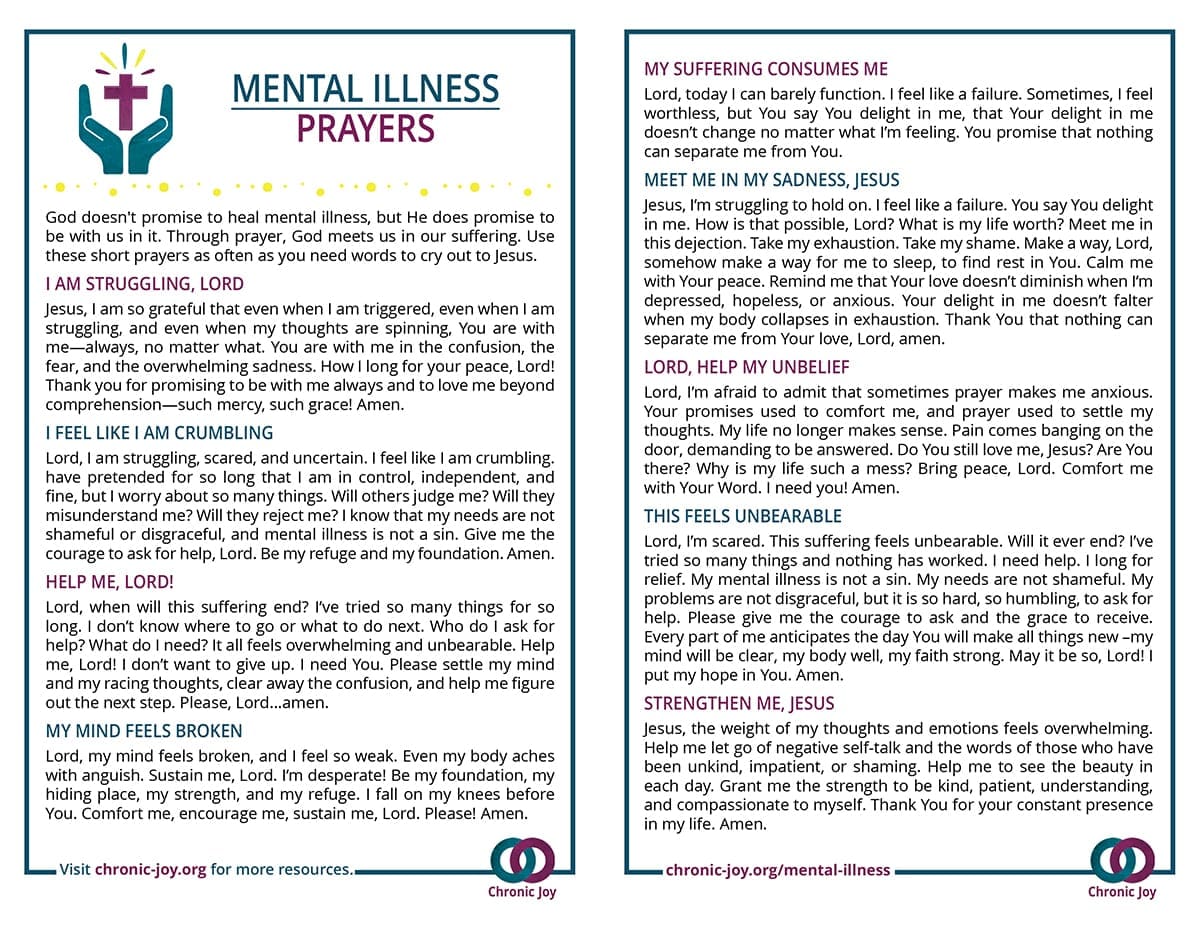
What hardship has entered your home without bothering to knock?
YOU SEEM LIKE YOU HAVE IT ALL TOGETHER
During a high school youth group meeting, we did an activity that involved saying nice things about the other people in our small group. I was shocked when one of the other girls said, “Amy, you just seem like you have it all together.”
I didn’t know what to say or remember how I responded. I do remember how surprised I was because it was so far from the truth. For one thing, I had the same insecurities and hang-ups as all the other adolescent girls in that room. Yet what had thrown me far from having it all together was that schizophrenia had come to our home without even bothering to knock and settled in for a long stay.
WHEN MENTAL ILLNESS COMES HOME
Mom had exhibited some signs of mental illness for as long as I had been around, but when I was 14, a period of extraordinary stress pushed her symptoms to the forefront. During my teenage years, my mom cycled through hospital stays and medications, delusions, and hallucinations. The rest of us tried to simultaneously understand what was happening and pretend it wasn’t happening at all. When my friend complimented me, I realized no one could see my pain and confusion.
I kept quiet about Mom’s illness because I didn’t understand it well enough to explain it. I knew people didn’t talk about that, and I desperately wanted to be normal. In fact, I had never heard a sermon that mentioned mental illness. I had never heard anyone suggest that people affected by mental illness still have a place in God’s plan.
SOME IMPORTANT THINGS ABOUT MENTAL ILLNESS
Since then, I’ve learned some important things about mental illness. If you’re suffering because you or a loved one has a mental illness, I’d like you to know these things, too:
- Mental illnesses are actual medical conditions caused by biological and environmental factors. They can be treated, and some treatments are up to 90% effective. As with many other medical conditions, successful treatment doesn’t necessarily mean the illness is cured. Yet therapy and medications can help people manage their disorders and live well.
- No matter what you feel, you are not alone. Each year, more than 25 percent of adults in the United States have a diagnosable mental illness. Mental illness is quite common. It’s about equal to the annual percentage of people diagnosed with cancer, heart disease, diabetes, and HIV/AIDS-related conditions—combined! Although many people don’t talk about their experiences with mental illness, you are surrounded by others who can relate to your suffering.
- God hasn’t abandoned you. In Romans 8:35-38, the apostle Paul (who suffered tremendously) asks: Does it mean [God] no longer loves us if we have trouble or calamity, or are persecuted, or hungry, or destitute, or in danger, or threatened with death? His answer: No! He wrote further that nothing (not even the powers of hell) can separate us from God’s love. Mental illness can feel like an attack from hell itself, but (regardless of how you may feel) it cannot drive God away from you. Abandonment is not in God’s nature.
- God has not broken His promises to you. Despite what our culture may suggest, comfort, happiness, and perfect health are not our natural state. God has not promised them to us in this life, and He doesn’t owe us anything. Humanity forfeited our claim to a perfect world way back at the beginning when we chose to reject God’s rule–and we have been making this choice ever since. Jesus didn’t promise us health or problem-free living in this life. In fact, He guaranteed we would suffer: Here on earth, you will have many trials and sorrows (John 16:33). Suffering is not unusual and should not surprise us. What is shocking is that despite our sorry condition, we have hope: But take heart, Jesus said, because I have overcome the world.
- Mental illness is NOT God’s punishment. We all deserve God’s punishment—and are all eligible for the grace He offers instead. You have not attracted special, cruel attention from God’s wrath. When Jesus and His disciples saw a man born with blindness, His disciples asked, “Why was this man born blind? Was it because of his own sins or his parents’ sins?” “It was not because of his sins or his parents’ sins,” Jesus answered. “This happened so the power of God could be seen in him.” God had a purpose in the man’s suffering, and it wasn’t punishment.
- This didn’t happen because you failed to pray enough, lacked faith, or didn’t read your Bible enough. Mental illness generally is not a spiritual problem (although the mind certainly can affect the spirit, and vice versa). A person with a mental illness has just that—an illness. While spiritual practices like prayer and Bible reading can help facilitate and support healing, illnesses require treatment. Besides, God does not hold Himself out of reach and demand that we earn His grace or demonstrate that we’re good enough for His healing touch. Jesus encouraged all who are weary and carry heavy burdens to come to Him and find rest for their souls. For my yoke is easy to bear, and the burden I give you is light (Matthew 11:28-30). He condemned legalistic religious leaders: For you crush people with unbearable religious demands, and you never lift a finger to ease the burden (Luke 11:46). Following Jesus may not be easy, but it’s not a religious burden. If someone is telling you your suffering would end if only you were a better Christian, that message is not from God.
- God always has a purpose for everyone. Our world tends to marginalize people who have mental illness, disabilities, and other conditions. Mental illness may alter the course of a person’s life, but it doesn’t mean that person’s life is no good anymore. Psalm 139 is a beautiful reminder of our value to God and His attention to the details of our lives. Verse 16 celebrates: You saw me before I was born. Every day of my life was recorded in your book. Every moment was laid out before a single day had passed.
- God wants to redeem your suffering. He is not surprised by your suffering and wants to use you! Sometimes, this means He’ll use that suffering to make you more like the person He wants you to be. Sometimes, it means your suffering will become a way for you to show His love and grace to someone else. (Maybe both things will be true.) You may never realize how God uses what you have been through, but He will use it—especially as you welcome His work in you. 2 Corinthians 4:7-11 tells us our suffering bodies (and your brain is a part of your body) are valuable to God’s work: Through suffering, our bodies continue to share in the death of Jesus so that the life of Jesus may also be seen in our bodies. Our bodies are fragile and unadorned, but Christians know they carry the presence of God’s Spirit in this world like fragile clay jars containing this great treasure. Mental illness doesn’t change the fact that we are called to represent him in these bodies. There is good news for those who want to see God’s power work through us: as Christ told the apostle Paul: My power works best in weakness (2 Corinthians 12:9).
- Someday, we will be remade, and all illness and suffering will cease. Our bodies are temporary and subject to the forces of decay, but someday, we will have new bodies (including new brains) that don’t break down. 2 Corinthians 5:1-5 describes the contrast between this earthly tent we live in and our permanent house in heaven, an eternal body made for us by God himself and not by human hands. Verse 4 provides a captivating image of what Jesus’ followers will experience someday: While we live in these earthly bodies, we groan and sigh, but it’s not that we want to die and get rid of these bodies that clothe us. Rather, we want to put on our new bodies so that these dying bodies will be swallowed up by life. Swallowed up by life! Can you imagine how that will feel? The vibrant, unimpeded life we all long for will be ours, and we will have no more reason for groaning!
GOD GIVES HOPE
God has never walked away from my family. I’m proud and thankful to say that after decades of struggle, Mom is now managing her illness very well. God has graciously done His healing work in me. I’m no longer ashamed or too confused to talk about what our family has experienced. In fact, I released a book (Troubled Minds) in 2013 that shares some of our family’s story. It also challenges Christians to understand how they can better support people affected by mental illness.
I see evidence of God’s redemption and grace all over my family’s story—even though my mother has not been healed of her disease, and we’ll go through plenty more suffering in this life. That is why we never give up. Though our bodies are dying, our spirits are being renewed every day. For our present troubles are small and won’t last very long. Yet they produce for us a glory that vastly outweighs them and will last forever! So, we don’t look at the troubles we can see now; rather, we fix our gaze on things that cannot be seen. For the things we see now will soon be gone, but the things we cannot see will last forever. (2 Corinthians 4:16-18)
First published at AmySimpson.com. Published with permission.
PRAYER
Father, mental illness can be so isolating. Sometimes, we feel no one else sees or understands. Thank You for always being with us, understanding us, and loving us as we are. Please bring people into our lives with whom we can share our burdens. We encounter many lies; Lord, help us believe the truth in Your word. We pray for Your presence and comfort as we walk this difficult road each day. In Jesus’ name, amen.
QUESTIONS FOR REFLECTION
- What hardship has entered your home without bothering to knock?
- Recount a time when you have felt ashamed or confused about what you (or someone you love) are experiencing.
- Take a minute to scan the Important Things About Mental Illness section in the post above. Which one touches you most closely today?


Amy Simpson
Amy is an editor for Moody Publishing and an award-winning author of numerous books (including Anxious: Choosing Faith in a World of Worry, Blessed Are the Unsatisfied: Finding Spiritual Freedom in an Imperfect World, and Troubled Minds: Mental Illness and the Church’s Mission). She has worked as a publishing executive and is a life and leadership coach. Amy and her husband, Trevor, live in Illinois and have two children.

Mental Illness Prayers
God doesn't promise to heal mental illness, but He does promise to be with us in it. Through prayer, God meets us in our suffering. Use these short prayers as often as you need words to cry out to Jesus.

Recent Comments